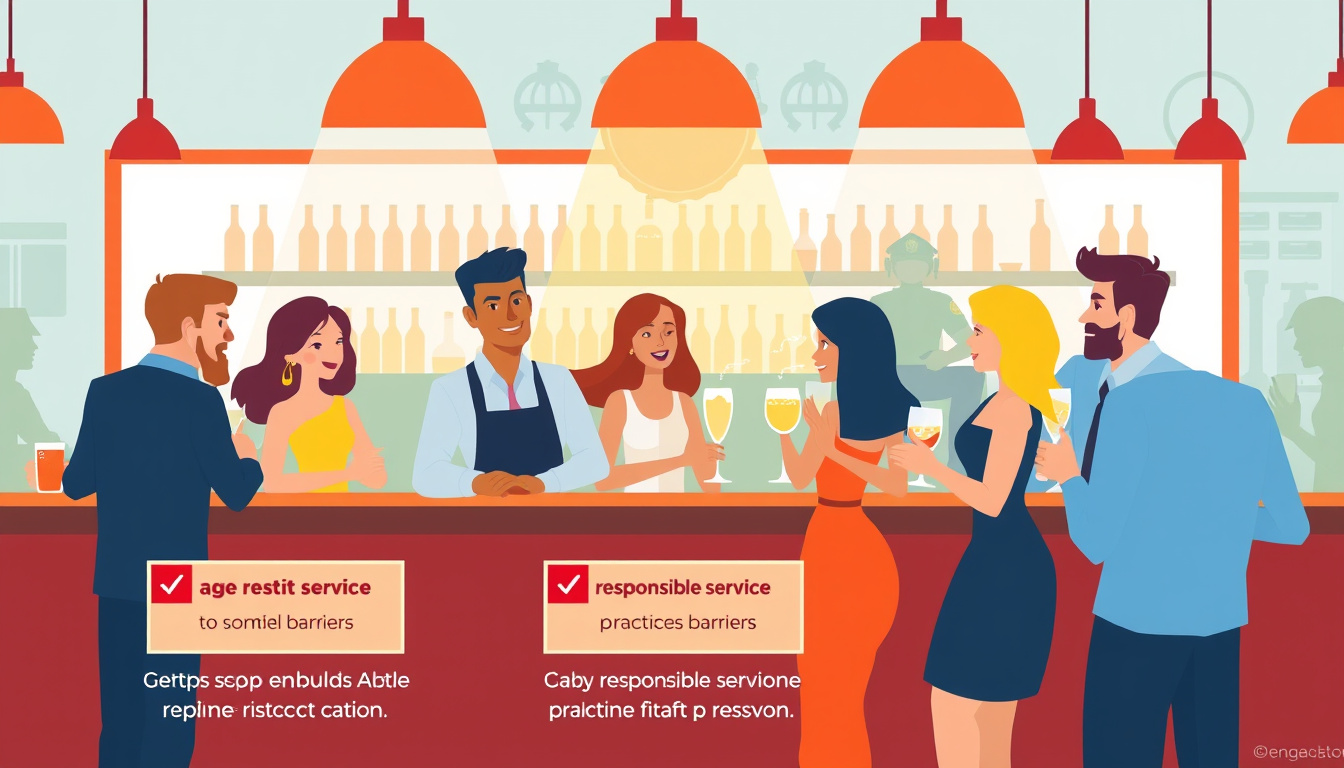If you’re a business owner in Louisiana considering serving alcohol, understanding the legal landscape is vital. Specifically, the legal risks of serving alcohol without a bar card in Louisiana can have significant financial and reputational implications for your establishment. In this article, we will explore the essential aspects of alcohol service laws, delve into the importance of obtaining a bar card, and highlight best practices to mitigate risks. Whether you’re a seasoned veteran in the hospitality industry or a newcomer, this guide will equip you with the knowledge needed to navigate the complexities surrounding alcohol service in the Pelican State.

Key Takeaways
- Serving alcohol in Louisiana without a bar card can lead to severe legal consequences.
- Many people misunderstand the specific requirements for alcohol service licensing in Louisiana.
- Violating alcohol service regulations may result in hefty fines and potential imprisonment.
- Establishing best practices for compliance can help mitigate risks associated with alcohol service.
- Utilizing available resources can enhance understanding of Louisiana’s alcohol service laws and regulations.
Understanding the Bar Card Requirement in Louisiana
In Louisiana, understanding the bar card requirement is essential for anyone involved in the service of alcoholic beverages. A bar card, often referred to as a serving license, is necessary for individuals who wish to serve alcohol in establishments like bars, restaurants, and clubs. This requirement not only helps maintain standards within the hospitality industry but also protects both the servers and the establishment from the legal risks of serving alcohol without a bar card. Failing to obtain this license can result in significant legal consequences, including fines and potential closure of the business. Moreover, without proper certification, servers may lack crucial knowledge of responsible alcohol service, increasing the risk of incidents such as over-serving guests or serving minors. Being informed about the legal requirements surrounding the bar card in Louisiana is vital for proprietors and their staff to ensure compliance and safety in their establishments.
Legal Implications of Serving Alcohol Without a Bar Card
In Louisiana, understanding the legal risks of serving alcohol without a bar card is crucial for anyone involved in the hospitality industry. A bar card, also known as an alcohol server permit, ensures that individuals are trained in responsible alcohol service and are familiar with state regulations regarding the sale and consumption of alcohol. Serving alcohol without this permit can lead to serious legal consequences, including hefty fines and potential criminal charges. Moreover, establishments can face significant liabilities, particularly if alcohol is served to minors or if intoxicated patrons cause harm. By adhering to state laws and obtaining a bar card, servers and business owners not only protect themselves legally but also contribute to a safer environment for their customers. This proactive approach is essential in maintaining compliance with Louisiana’s strict alcohol regulations, ultimately safeguarding your business reputation and ensuring smooth operations.
‘The law is not a mere act of will, but an expression of the community’s normative framework for regulating behavior.’ – John Rawls

Common Misconceptions About Alcohol Service Laws
When it comes to serving alcohol in Louisiana, there are several common misconceptions that can lead to serious consequences. One of the most significant misunderstandings is the perception that serving alcohol without a bar card is permissible under certain circumstances. However, the legal risks of serving alcohol without a bar card in Louisiana can be substantial. Many individuals believe that informal gatherings or private events are exempt from licensing regulations, but this is far from the truth. In reality, any form of alcohol service typically requires compliance with state laws, including the necessity of obtaining proper licensing, such as a bar card. Failure to adhere to these regulations not only exposes servers and establishments to hefty fines and legal liability, but it can also jeopardize the safety of patrons and the community at large. Understanding and navigating the intricacies of alcohol service laws is essential for anyone looking to serve alcohol legally in Louisiana, making awareness of these misconceptions vital.
Penalties for Violating Alcohol Serving Regulations
In Louisiana, the legal risks of serving alcohol without a bar card can lead to significant penalties for both the establishment and individual servers. The state mandates that anyone engaging in the sale or service of alcoholic beverages must possess a valid alcoholic beverage permit, commonly referred to as a bar card, issued by the Louisiana Office of Alcohol and Tobacco Control (ATC). Failing to comply with this regulation can result in hefty fines, suspension of the business license, or even criminal charges for responsible parties. Moreover, establishments risk civil liability, particularly if they serve minors or intoxicated patrons, which could result in lawsuits or increased insurance rates. Therefore, it is crucial for businesses and employees in the beverage service industry to understand and adhere to the legal requirements surrounding alcohol service in Louisiana to mitigate these risks and ensure the safe and responsible serving of alcohol.

Best Practices for Compliance and Risk Mitigation
Serving alcohol in Louisiana can be a lucrative business, but it also comes with significant legal responsibilities. One of the critical concerns for establishments is the legal risks of serving alcohol without a bar card. To mitigate these risks, it’s vital for business owners to align with best practices for compliance and risk management. First and foremost, ensure all staff members involved in alcohol service possess valid bar cards, which indicate they’ve undergone appropriate training regarding the responsible serving of alcohol. This training educates employees on identifying intoxicated patrons, minimizing liability, and understanding state laws that govern alcohol service. Additionally, it’s prudent to establish clear policies and procedures for checking IDs, refusing service, and handling situations involving underage drinking or intoxication. Document these procedures and conduct regular training refreshers to reinforce them among staff. Furthermore, maintaining adequate insurance coverage that includes liquor liability is essential for protecting your business in case of incidents. By focusing on these best practices, businesses can greatly reduce the legal risks of serving alcohol without a bar card in Louisiana while fostering a safe and compliant environment.
Resources for Learning About Alcohol Service Laws
Navigating the laws surrounding alcohol service can be a complex endeavor, especially in a state like Louisiana, known for its vibrant nightlife and diverse culinary scene. Understanding the legal risks of serving alcohol without a bar card in Louisiana is paramount for anyone involved in the hospitality industry. Serving alcohol without the required training can lead to significant consequences, including hefty fines, potential lawsuits, and even the loss of your business license. Fortunately, there are numerous resources available for learning about alcohol service laws in Louisiana. The Louisiana Office of Alcohol and Tobacco Control (ATC) provides comprehensive guidelines and training requirements online, which are invaluable for bartenders and business owners. Additionally, local community colleges and vocational schools often offer courses that not only cover the legal aspects but also equip you with essential bartending skills. Engaging with professional associations and attending workshops can also deepen your understanding of best practices when it comes to legal compliance in alcohol service. By taking advantage of these resources, you can ensure that you are not only serving responsibly but also protecting yourself from the legal ramifications associated with improper alcohol service.


